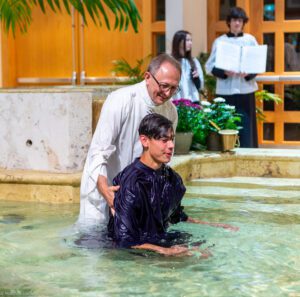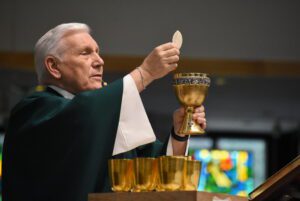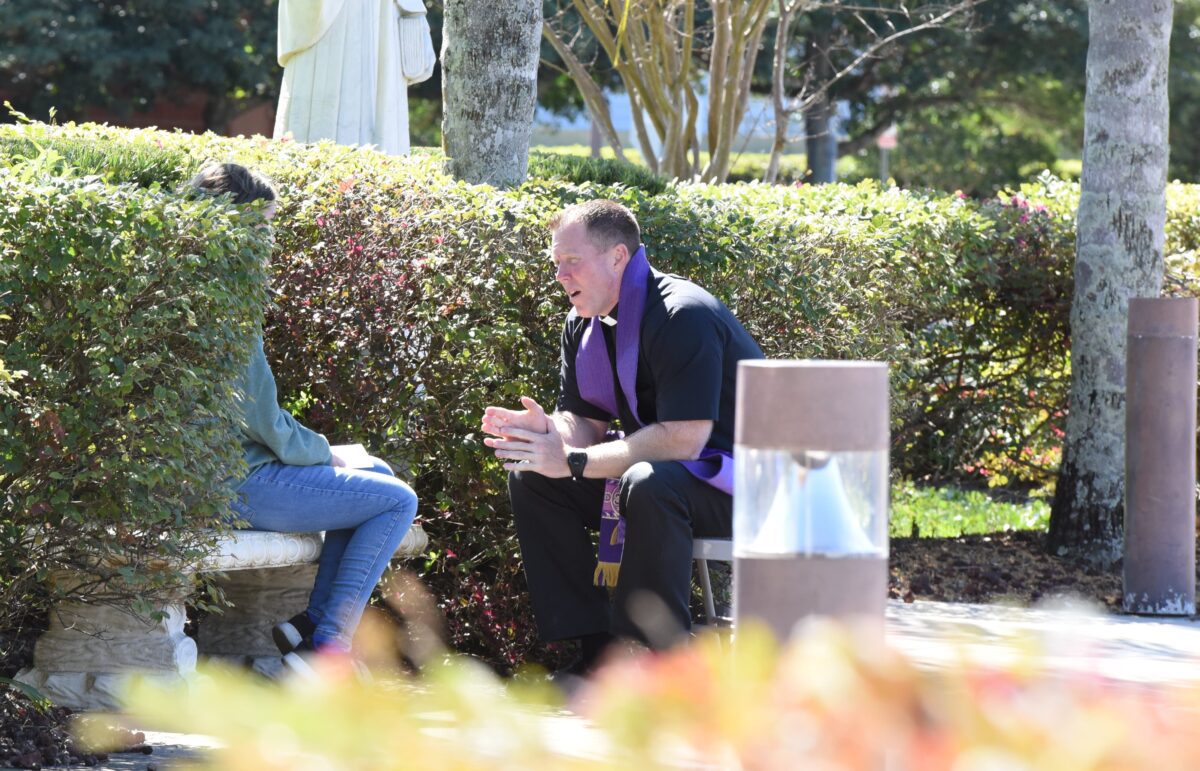Rising from the cross of sin to new life, our journey of reconciliation during Lent leads us to Easter Resurrection and Eucharist – God’s gift of Himself that we might be born anew.
It is a journey inward that reveals what must be reconciled to deepen our relationship with the Lord, explained Bishop John Noonan.
“When going to confession, you’re asking God to forgive and heal you, so you have the grace and strength needed, and then when you go to Communion, you receive the fullness of the graces granted in the Eucharist,” the bishop said. “We’ve lost the sense of sinfulness so therefore we’re going to Communion, but we can’t appreciate it because we’re not ready.”
Bishop Noonan likened the Sacrament to giving food to a baby who still drinks from a bottle.
“They can’t take it,” he said, noting the similarities with our own lives and how we deal with struggle. “Are we truly being honest with ourselves? It’s not that (priests) are looking for sins. We’re asking, where are you with God? When people really go to confession, you feel and hear it in their voice that they had time to think about this. And it’s not about how bad the sins were, but where they are in their relationship with God and that has a real and unusual substance.”
The goal is for the faithful to truly view the Sacrament of Reconciliation as a gift, to know God waits there to heal us and wrap us in His love.
“If we don’t understand Reconciliation, we’ll never understand or receive the grace of the Eucharist,” Bishop Noonan said. “It’s not about punishment. It’s time to grow spiritually and receive insights into who we are and what God wants to do with our lives. … Everything is built on a relationship with Christ. And if you, for Lent, can have a relationship with Christ, deepen that relationship, then you’ve accomplished a lot. The rest will come automatically.”
Urging us to go forth in trust, Bishop Noonan recalled the words of Socrates: “The unexamined life is not worth living.”
“I think Lent asks very important questions,” the bishop said. “It’s reminding us to get away, in a sense, from all the things going on in our lives and start the day asking, what do we need to do to better our relationship with God? Pick one thing. Try it. Think in a new way and do something different to enrich your life.”
Father Anthony Aarons, rector of the Basilica of the National Shrine of Mary, Queen of the Universe and Missionary of Mercy appointed by Pope Francis agreed. “To be quite frank, if we are in that state of sin, we will not see Him. We will not recognize Jesus because sin blinds us from seeing the face of God.”
Lent can be viewed as a long period of the Sacrament of Reconciliation explained Father Aarons. He recalled Jesus’s words when He appeared to His disciples on Easter: “He breathed on them, and said to them, ‘Receive the Holy Spirit. If you forgive the sins of any, they are forgiven; if you retain the sins of any, they are retained’” (Jn 20:21-23).
“The whole thing is that Easter becomes the empowerment of these Apostles to take away the sins of other people,” Father Aarons shared. “Therefore, the connection is made with Easter as the time of celebrating the freedom from sin.”

By Jesus submitting to being baptized, then going into the desert for 40 days and fasting, he identifies with our human condition, Father Aarons explained. Confession, fasting from sin leads to the resurrection of the human spirit, through Christ’s resurrection. It is a reminder he said, “our life begins in Baptism and we, to preserve that life, need to be involved in that fasting.” He explained fasting, prayer, and almsgiving are all Lenten ways of penance, clearing the way to a deeper relationship with Christ so we might share in His life, death and resurrection, seen through the prayer of the Triduum – Holy Thursday in the Last Supper, His death on the cross on Good Friday, and His resurrection celebrated at the Easter Vigil.
Calling to mind the Mass, he reminds us of our preparation to receive the Eucharist by calling to mind our sins. “Just before we receive Holy Communion, we’re told, ‘Behold the Lamb of God who takes away the sins of the world’. In our celebration, we realize this is what Jesus does. He takes away our sins and the Eucharist becomes a means for us of celebrating the fact that our sins are taken away, because we’re celebrating our own life, death and resurrection in Him,” he said. “That’s how we will find meaning. Because we’ve been given life, and our life has been damaged by sin. So, we’re being encouraged to die to sin in order to rise to eternal life with Jesus.”
“Going to confession purifies me to receive the grace of the Sacrament and it makes me more receptive to the body and blood of Christ when I do receive it,” added Father George Nursey, parochial administrator of St. Stephen Parish in Winter Springs and former professor of Liturgical and Sacramental Theology at St. Vincent de Paul Seminary. Some of the faithful feel unless they have committed mortal sin, they can speak with God personally and skip confession. Father Nursey challenged that idea.
“How do we know what our motives are, the degree of contrition we have for our sins?” Father Nursey asked. “It’s good to have an objective party to be able to see those things. The other thing is our sins are not just between us and God. As St. Paul tells us (1 Cor 12: 12-14), we belong to the Body of Christ. When we sin, we affect the rest of the body.”

He encouraged the Sacrament of Reconciliation to strengthen us in the fight against evil. In the Sacrament, the priest accompanies the penitent, in a sense, on his or her way to the Eucharist at Easter and every Sunday. The journey prepares and purifies us to meet and receive Christ in the Eucharist, to share in the Easter resurrection, and the hope of life eternal.
“That spiritual struggle during Lent should be a time when we’re striving against our sinful actions, to be particularly watchful so God’s life within becomes more evident,” Father Nursey said. “The perfect place to fight those spiritual battles is through the Sacrament of Reconciliation. We receive grace, the grace to do battle with our evil inclinations,” he said, allowing us to more fully experience the resurrection present in the Eucharist at Easter.
By Glenda Meekins of the Florida Catholic staff, February 08, 2024

